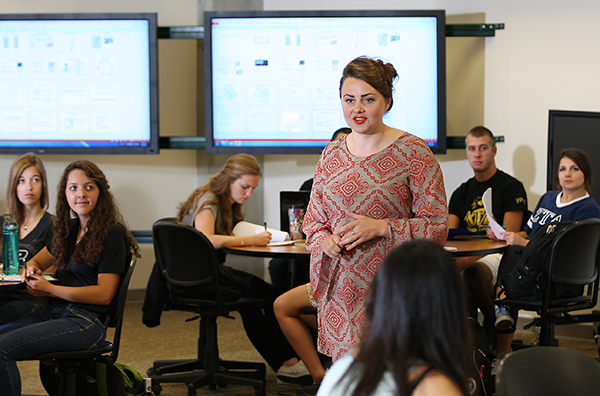September 28, 2016
Know what caused your diarrhea? Probably not, says Purdue researcher

Educating students and consumers on the difference between food quality and safety is an important part of improving food security, says Haley Oliver, associate professor in Purdue University's Food Science Department (Purdue Agriculture/Tom Campbell)
WEST LAFAYETTE, Ind. – Call it a gut feeling, but Purdue University researcher Haley Oliver is pretty sure that nearly everyone has suffered from diarrhea at some point.
"Some people will admit it and some won't, but either way, you've probably had it," said Oliver, an associate professor in Purdue's food science department.
In searching for a cause, people often blame something they recently ate or drank, such as sour milk or wilted lettuce. However, Oliver said such blame is usually misplaced. There is an important difference between food quality and food safety, she said - "quality" refers to how consumers perceive the taste, smell, color and freshness of a product, while "safety" means the absence of harmful pathogens, toxins and substances like sand or glass.
"There is a difference between the microbes that cause spoilage, or low quality, and the microbes that cause disease," Oliver said. "If you leave something out on the counter, it will start growing mold in a day or two, but if there wasn't a pathogen like salmonella already present, it's not going to magically appear. The organisms that take over that product are spoilage organisms."
That means a food whose quality seems questionable may actually be safe - and food that seems fine may contain lethal pathogens, Oliver said.
"Humans probably learned over time not to eat spoiled foods because the conditions that support the growth of spoilage organisms also support the growth of pathogens," she said. "But pathogens like E. coli, listeria and salmonella come from soil and from animals, and they do not change the properties of the food."
This relationship between quality and safety is tied to a third issue - food security. Oliver says that much of the world's yearly food loss is due to people throwing out food that seems to be lower quality but is still safe.
"In some parts of the world, food is mostly lost at the production level to factors like insects or mold," she said, "but here in the U.S., we compound that with loss at the consumer level. Many consumers have the luxury of choice here, and those choices are often made based on perceived quality. We're losing absurd amounts of food this way."
Oliver will be discussing this three-way relationship and its impact in the U.S. and Afghanistan, where she and her colleagues are helping to build the country's first university-based food technology program, at Purdue University's Dawn or Doom 2016 conference. Her lecture, "You Think You Know What Food Caused Your Diarrhea: Detangling Food Safety and Food Quality," will be at 1 p.m. Oct. 4 in Stewart Center, Room 206.
In places such as Afghanistan, quality is the main criterion for purchasing, especially fruits and vegetables. Food safety education and understanding of germ theory are limited there, so it makes sense that fresh-looking, clean produce would seem safer than produce that had been stored at an improper temperature or that was contaminated with dirt or other impurities, Oliver said.
However, the quality-safety discrepancy comes into play here, too.
"Here in the U.S., we depend on our functional regulatory systems to monitor and enforce food safety, but a consumer from another country might not have the safeguards that we have here," Oliver said. "People in Afghanistan depend on sight, smell and so on to make their decision. But without a basic knowledge of microbes and foodborne illness, something that looks fresh could have been grown with unsafe irrigation water, or misted at the market with water that has fecal matter in it."
Oliver and her team are combating this divide with education in safe handling practices and preservation. Because traditional preservation methods are mostly limited to drying, which could expose food to contaminated dirt or sand, one simple way to make food safer is to teach people how to can it - a revolutionary concept for many people, Oliver said. Other education efforts focus on safe irrigation, testing well water and proper hand-washing techniques.
"When we first started, we were training people in basic food safety language - 'wash your hands, don't eat poop,'" Oliver said. "It doesn't seem that hard, but it can be hard in practice when you can't see what's in your water. We're just trying to build the conversation around the extreme basics."
Registration for Dawn or Doom 2016 is free and can be accessed online at http://bit.ly/DoDRegister. For more information, visit http://www.purdue.edu/dawnordoom/.
Writer: Jessica Merzdorf, 765-494-7719, jmerzdor@purdue.edu
Source: Haley Oliver, 765-496-3913, hfoliver@purdue.edu
Agricultural Communications: (765) 494-8415;
Darrin Pack, dpack@purdue.edu
Agriculture News Page

